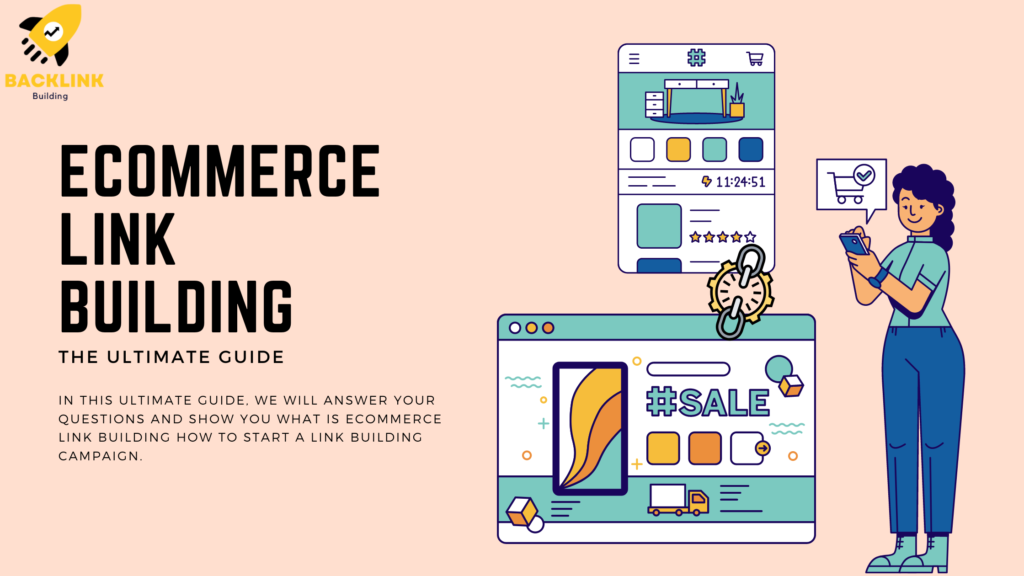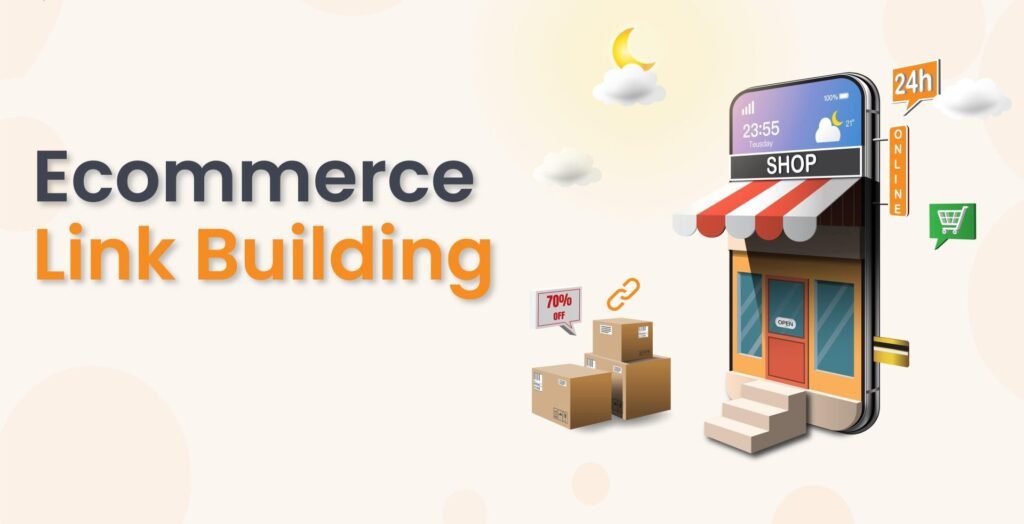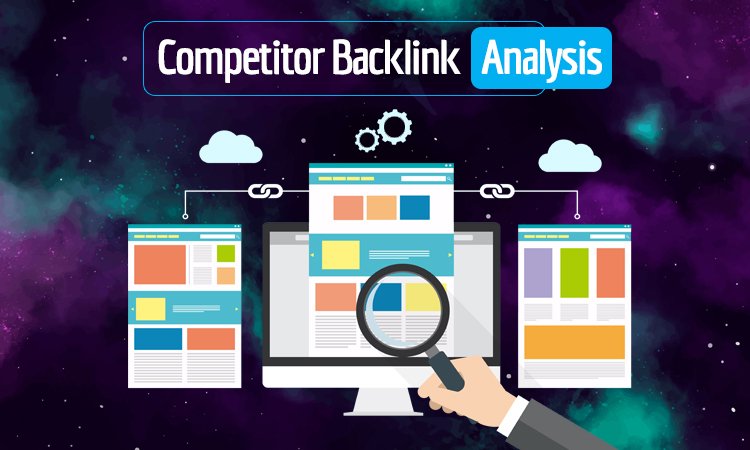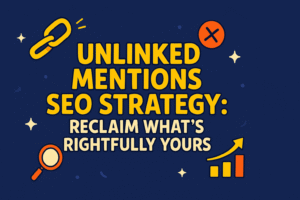
To stay ahead of the competition, eCommerce businesses must continuously find new and innovative ways to increase traffic and sales. One of the most effective techniques for doing this is through link building. But what is link building? And more importantly, how can eCommerce link building be used for business use and their advantage? In this ultimate guide, we will answer your questions and show you how to start an ecommerce link building campaign that will help improve your website’s ranking and visibility. Let’s get started!
What Is Link Building?

Link building is acquiring links from other websites to your own. These links act as votes of confidence from other sources, telling search engines that your site is a valuable and trustworthy resource. The more high-quality links you have pointing to your ecommerce store, the higher you will rank in search results pages.
Types Of Links
There are two types of links that you can build:
- Do-follow links: These are the most valuable links as they tell search engines to follow and count the link.
- Nofollow links: These links tell search engines not to follow or count the link. While they may not directly improve your website’s ranking, they
Factors That Search Engines Evaluate In Your Backlink Profile
- Authority: Links from sites with high domain authority will carry more weight than those from low-authority areas. Authority signals to search engines that a site is a reliable and popular source of information. To find out a site’s domain authority, you can use Moz’s free MozBar tool.
- Trust: Trust is another crucial factor that search engines consider when evaluating links. Sites that have been around for a long time and have built up a strong reputation are more likely to be trusted by search engines than newer sites.
- Relevancy: Links from relevant sources will carry more weight than those from non-relevant sources. For example, if you sell a women’s fashion ecommerce site, then links from other fashion ecommerce sites would be more valuable than links from general ecommerce sites.
- Link Placement: The location of the link on the page also matters. A link in the body of an article will carry more weight than a link in the footer or sidebar.
- Anchor Text: The anchor text is the text that is used to link to your ecommerce store. For example, if someone links to your site with the anchor text “women’s fashion e-commerce,” that would tell search engines that your site is relevant for that keyword.
- Nofollow Attribute: The nofollow attribute tells search engines not to follow a particular link. This is usually used when a site links to another site that it does not fully trust. However, even if a link has the nofollow attribute, it can still help improve your visibility in search results pages.
Now that you know what factors search engines consider when evaluating links, let’s understand why building links for e-commerce businesses is essential.
Why Is Link Building Important For eCommerce Businesses?

Link building is essential for eCommerce businesses because it can help them improve their ranking on search results pages. In addition, links drive traffic to your ecommerce store and help increase sales.
Here Are Some Benefits Of Ecommerce Link Building:
- It Helps improve your ranking on search results pages
- It Can drive traffic to your ecommerce and help build trust and credibility.
- It Can help increase sales
- Helps improve click-through rate (CTR)
- It can increase brand awareness
- It helps you get insights into your competitor’s marketing strategy
- It helps you find new business opportunities
- It helps you build relationships with other ecommerce business
- helps you understand your customers better
Now that we’ve covered benefits let’s look at some of the best ways to build links for eCommerce businesses.
Ecommerce Link Building Strategies
There are many different link building strategies for ecommerce. Some of the most effective methods include:
Performing Competitor Backlink Analysis

Analyzing your competitor’s backlinks is one of the best ecommerce link building tactics. This will give you an idea of where they are getting their links and what kind of links they are acquiring.
You can use a tool like Moz’s Open Site Explorer or Majestic SEO for competitor backlink analysis. There are certain things you need to focus on while performing competitor backlink analysis, such as :
- Number of links
- Quality of links
- Anchor text used
Note: Focus on Dofollow links
As link building is a continuous process, you must stay updated about your competitors. Most eCommerce brands regularly monitor their competitors to ensure that they are always ahead of them.
Run Contests, Promotions & Collaborations
For any eCommerce brand, Promotions and collaborations are great ways to generate sales and Increase revenue. eCommerce brands can use this opportunity to get high-quality links from other websites.
There are certain things you need to focus on while running contests, promotions, and collaborations, such as:
- Ensure that the game is relevant to your eCommerce business
- Make sure the rules are easy to understand
- Advertise the contest on social media and other channels
- Choose a prize that will be appealing to your target audience
Most eCommerce brands run contests and promotions all the time. For example, eCommerce brands can give away a prize for the best design using their products. This will encourage other designers to link to the eCommerce brand’s website. These types of promotions are often very successful in generating links and sales.
Set Up An Affiliate Marketing Program

Affiliate marketing is performance-based marketing in which eCommerce businesses reward affiliates for each customer they bring in. It is a great way to generate links and sales.
There are certain things you need to focus on while setting up an affiliate marketing program, such as:
- Selecting the right affiliate network
- Choosing the right products or services to promote
- Offering attractive commissions
- Providing creative and effective promotional materials
- Monitoring the performance of your affiliates
Affiliate programs are a great way to generate higher revenue. For example, eCommerce brands can offer a commission for every sale made through an affiliate link. This will encourage other websites to link to the eCommerce brand’s website.
Guest Posting Campaign
Guest posting is when eCommerce businesses write articles for other websites in their industry. It is a great way to get exposure for your eCommerce business.
There are certain things you need to focus on while running a guest posting campaign, such as:
- Finding the right websites to guest post on
- Writing high-quality and informative articles
- Including a link back to your eCommerce website
- Make sure the article is relevant to your eCommerce business
- Monitoring the results of your guest posting campaign
For example, eCommerce brands can write an article about “The Top Trends in eCommerce for 2025”. This will expose eCommerce brands to their target audience and help them get links from other websites. You can post on different link building for ecommerce websites.
Get Listed On The “Where To Buy” Pages
Many eCommerce businesses are unaware of this, but many websites have a “where to buy” page that lists where a particular product or service can be bought. eCommerce businesses can get links from these websites by listing their products or services on these pages.
There are certain things you need to focus on while getting listed on the “where to buy” pages, such as:
- Finding the right websites to list your eCommerce business on
- Make sure your eCommerce business is listed in the correct category
- Including all the relevant information about your eCommerce business
- Monitoring the results of your listing
For example, eCommerce brands can list their products on a website’s “where to buy” page that sells similar products. This will help brands get exposure and also link building for ecommerce sites.
Find Unlinked Mentions
An unlinked mention is when your eCommerce business is mentioned on a website, but there is no link to your eCommerce website. eCommerce businesses can get links from these websites by asking the website to add a link to their eCommerce website.
Procedure:
- Finding websites that have mentioned your eCommerce business
- Reaching out to the website and asking them to add a link
- Monitoring the results of your campaign
For example, brands can use Google Alerts to find link building ecommerce websites that have mentioned their eCommerce business.
Look For Sponsorship Opportunities
A sponsorship is when eCommerce businesses sponsor an event or product. eCommerce businesses not only get links from these websites, but they also increase Brand awareness by sponsoring an event or product.
Procedure:
- Finding suitable events or products to sponsor
- Once the product or event is sponsored, later ask them to add a link
- Monitoring the results of your campaign
For example, eCommerce brands can use Google to find events or products they can sponsor. eCommerce brands can also use social media to find sponsorship opportunities.
Create A Comprehensive Buyer’s Guide
A buyer’s guide is a detailed guide that helps eCommerce buyers make an informed decision about a product or service. eCommerce businesses can create these guides, including links to various eCommerce website pages.
Procedure:
- Creating a buyer’s guide
- Including links to eCommerce website pages
- Monitoring the results
Create FAQ Content
FAQ content answers eCommerce-related questions. eCommerce businesses can answer these questions and include link pages to drive organic traffic.
Procedure:
- Creating FAQ content
- Including links to eCommerce website pages
- Monitoring campaign results.
Feature Influencers
An influencer is a person who has the power to influence eCommerce buyers. E-commerce businesses target the Influencer’s target audience (followers/subscribers) to Increase Brand Awareness, sales, etc. E-commerce businesses not only get links by featuring these influencers on their e-commerce website or blog.
Procedure:
- Identifying eCommerce influencers
- Reaching out to eCommerce influencers and asking them to be featured
- Monitoring the result to determine whether the Influencer is beneficial or not.
These are some eCommerce link-building ideas that businesses can use to get links in 2025. To get links from high-quality websites, businesses must create quality content, perform competitor backlink analysis, and run link-building campaigns.
How Many Backlinks Do Ecommerce Businesses Need?
The number of backlinks eCommerce businesses need depends on the competition for the keywords that ecommerce business wants to rank for.
- If the competition is low, ecommerce businesses will need fewer backlinks to rank. However,
- If the competition is high, ecommerce businesses will need more backlinks to rank.
When Should Ecommerce Businesses Start Building Backlinks?
eCommerce businesses should start building links as soon as they launch their eCommerce website. The sooner eCommerce businesses build backlinks, the sooner they will start ranking in Google.
Is It Possible To Rank Ecommerce Businesses Without Backlinks?
No, eCommerce businesses cannot rank without backlinks. Backlinks are an important ranking factor for eCommerce websites, whether they’re an E-Commerce business or any other type of website.
Google Guidelines For Ecommerce Link Building
When eCommerce businesses build links, they should always follow Google’s guidelines. eCommerce businesses that don’t follow Google’s guidelines may get their eCommerce website penalized by Google.
Here are some of Google’s link-building guidelines that ecommerce businesses should follow:
- Do not buy or sell links
- Do not engage in link schemes
- Avoid excessive link exchanging
- Do not use automated programs to create links
Failure to follow these guidelines can result in ecommerce websites being penalized by Google. As a result, ecommerce businesses will lose traffic and sales.
Conclusion
From the above guide, ecommerce businesses can understand the process of ecommerce link building and what type of ecommerce link building activities they should perform to get links from high-quality websites.
Moreover, ecommerce businesses should always follow Google’s guidelines when they build links. Failure to follow these guidelines can result in ecommerce websites being penalized by Google.
Thank you for reading this guide! We hope it was helpful and you can use these ecommerce link-building tips to get links for your eCommerce website in 2025. If you have questions regarding this guide or any other backlink-building process, please leave them in the comment section. We will be happy to answer you.


